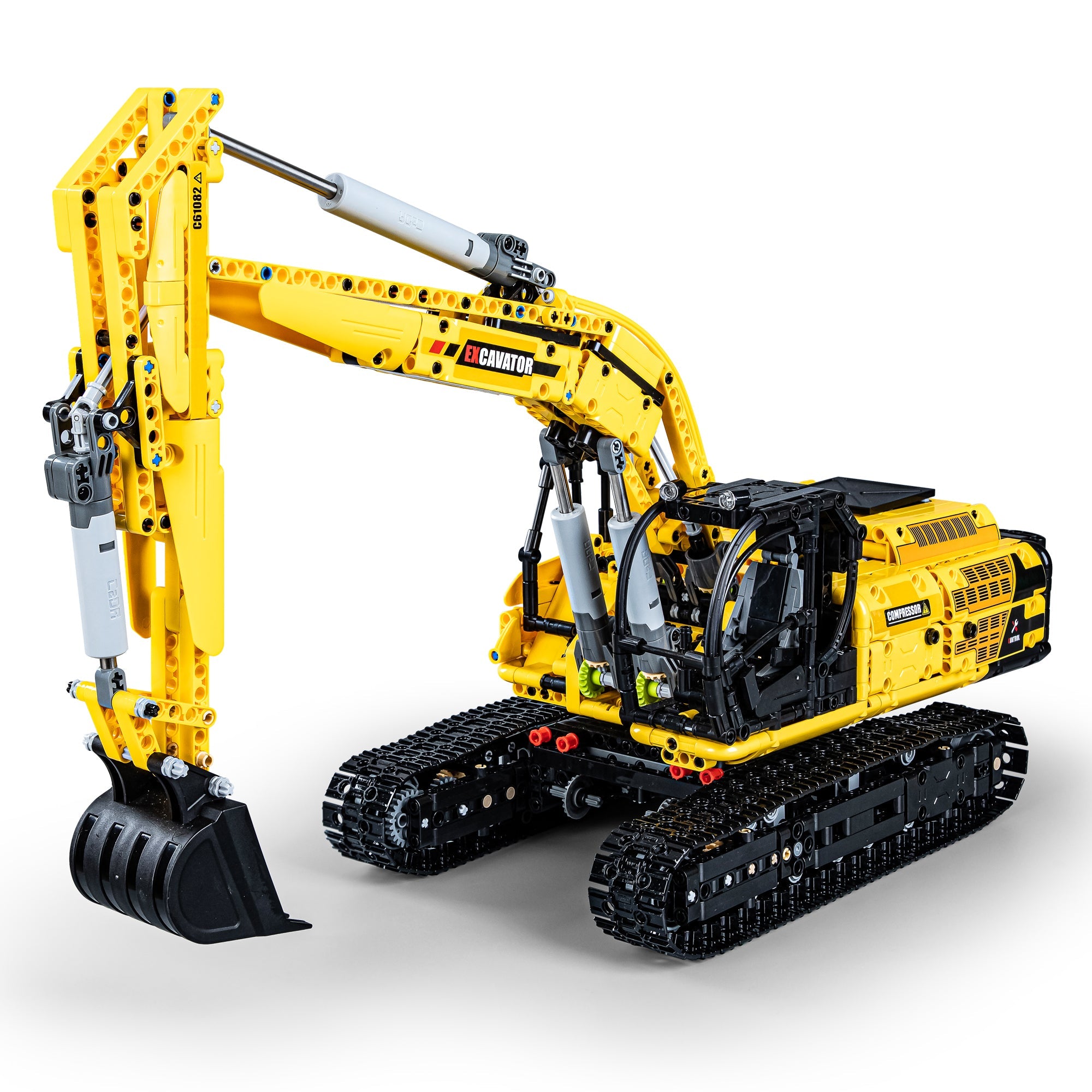Discover the Importance of Excavator in Modern Building Projects
Excavators are vital tools in contemporary building and construction tasks. Their flexibility permits them to perform a large range of tasks, from digging and grading to demolition and site prep work. Advanced attributes, such as hydraulic attachments and general practitioners, enhance their abilities and effectiveness on job sites. As the sector advances, the relevance of excavators expands a lot more. Understanding their role can expose understandings right into the future of construction methods. What exists in advance for these devices?
The Convenience of Excavators in Various Projects
Although excavators are usually related to large building and construction jobs, their adaptability permits them to be utilized in a vast array of applications, from residential landscaping to energy upkeep. In city setups, excavators can browse tight spaces to dig structures for homes or set up drain systems. Their capability to carry out fragile jobs makes them ideal for landscaping projects, where they can dig deep into for ponds or plant trees. Furthermore, excavators play a crucial role in utility upkeep, efficiently digging trenches for pipelines or cable televisions without disrupting bordering areas. In farming applications, they assist in land clearing and dirt prep work. Their adaptability enables them to be outfitted with numerous accessories, improving their performance throughout various tasks. This multifaceted nature of excavators not just enhances various construction processes but additionally shows their indispensable duty in modern framework advancement and maintenance.
Secret Features and Kinds Of Excavators
The discussion on vital features and types of excavators highlights the necessary characteristics that make these machines invaluable in building and construction. Various excavator types, each designed for certain jobs, demonstrate their convenience and efficiency across different applications. rc excavator. Understanding these categories and functions is important for maximizing their usage in contemporary construction projects
Excavator Keys In Review
Excavators play a critical duty in contemporary construction, supplying versatility and effectiveness across numerous jobs. These hefty machinery units come in a number of kinds, each customized for details applications. One of the most typical kinds include crawler excavators, understood for their security on unequal surface, and wheeled excavators, which offer greater flexibility on paved surface areas. Small excavators are favored for small tasks and limited rooms, while long-reach excavators are designed for deep excavating. Furthermore, there are customized excavators, such as hydraulic excavators, which boost power and accuracy. Each type includes one-of-a-kind abilities, making them vital for tasks varying from digging and grading to demolition and material handling. Understanding these variants allows building professionals to pick the ideal excavator for their job needs.
Secret Features Explained
Understanding the crucial functions of excavators improves their efficient application in building projects. Excavators are identified by their powerful hydraulic systems, which supply the required force for digging, lifting, and moving products. Their verbalized arms permit a large range of movement, helping with exact procedures in restricted spaces. In addition, the variety of add-ons, such as containers, grapples, and augers, broadens their versatility to fulfill different task needs. The size and weight of excavators additionally add to their security and ability to move on various surfaces. Advancements in modern technology have led to the assimilation of GPS and automation, boosting accuracy and effectiveness in excavation jobs. These features jointly place excavators as indispensable tools in contemporary construction.
Applications in Building
Changing building and construction websites, excavators play a critical role throughout various applications, ranging from property structure projects to large-scale facilities developments. These versatile devices are equipped for jobs such as excavating structures, trenching for energies, and website grading. Different kinds of excavators, including spider, rolled, and mini excavators, provide specific benefits tailored to the job demands. Spider excavators master harsh surfaces, while wheeled excavators use mobility on paved surfaces. Miniature excavators are suitable for constrained spaces, making them preferred in urban settings. The efficiency and power of excavators substantially quicken construction processes, ensuring timely job conclusion. Their adaptability additionally boosts their importance, allowing construction teams to deal with a diverse array of difficulties properly.
Enhancing Effectiveness and Productivity on Job Sites
Taking full advantage of effectiveness and productivity on task sites is a vital objective in modern-day construction. Excavators play a pivotal function in achieving this objective by streamlining numerous jobs. Their ability to perform multiple functions-- such as grading, excavating, and lifting-- reduces the requirement for additional tools, thus saving time and resources.Moreover, excavators improve process by permitting for faster completion of tasks. With advanced features like hydraulic attachments and GPS technology, they can implement specific procedures that reduce mistakes and remodel. This accuracy not just improves the quality of job however also enhances product use, contributing to cost savings.The convenience of excavators enables them to adjust to various site problems, making certain that jobs progress smoothly despite challenges. By incorporating excavators right into construction processes, teams can substantially increase their general productivity, leading to prompt project conclusion and boosted earnings.
Safety And Security Advantages of Utilizing Excavators
Excavators greatly improve safety on construction sites through improved operator visibility and decreased manual work risks. By providing operators with a clear sight of their environments, excavators informative post help to avoid injuries and crashes. In addition, the equipment decreases the need for workers to engage in hazardous manual tasks, even more promoting a safer work setting.
Boosted Operator Exposure
Although building and construction sites can be chaotic and full of possible threats, enhanced operator visibility plays a necessary role in making sure safety when making use of excavators. Modern excavators are developed with big, unobstructed windows and purposefully placed mirrors, enabling drivers to preserve a clear view of their surroundings (rc excavator). This boosted exposure is important for identifying pedestrians, various other equipment, and various barriers, significantly decreasing the danger of crashes. Additionally, numerous excavators incorporate innovative technology, such as sensors and cams, to offer drivers with additional viewpoints, even more enhancing understanding. The capacity to see even more clearly not just aids in efficient operation but likewise cultivates a much safer workplace, making it easier for drivers to navigate complex construction sites without endangering safety criteria
Reduced Manual Work Risks
When manual labor is decreased via the use of excavators, countless safety advantages emerge, markedly boosting the well-being of building and construction employees. Excavators decrease the physical strain related to hefty lifting and recurring tasks, successfully reducing the risk of musculoskeletal injuries. By automating processes such as excavating, grading, and moving materials, they allow workers to maintain a safer range from prospective dangers. Furthermore, excavators are geared up with innovative safety and security attributes, such as rollover security systems and enhanced operator functional designs, which further guard employees on site. The outcome is a significant decrease in workplace crashes and injuries, causing increased efficiency and morale amongst building and construction teams. Eventually, the fostering of excavators adds to a safer and extra reliable building and construction atmosphere.
Excavators in Earthmoving and Website Preparation
In modern building and construction, a substantial section of earthmoving and site preparation jobs depends on the efficiency and flexibility of excavators. These makers are designed to deal with various dirt kinds and surface, making them important for grading, digging, and trenching tasks. Their hydraulic arms can be outfitted with different add-ons, such as augers and buckets, enabling operators to customize their technique based upon particular project requirements.Excavators succeed at moving big volumes of earth swiftly and efficiently, which increases the general building timeline. They can navigate limited areas and testing websites where traditional tools may struggle, enhancing productivity. Additionally, the accuracy of excavators guarantees that site preparation complies with strict requirements, decreasing the danger of errors that might bring about costly rework.
The Function of Excavators in Demolition Tasks
Excavators play an important role in demolition jobs, as they have the power and dexterity needed to dismantle structures efficiently. Furnished with numerous accessories such as hydraulic breakers, shears, and grapples, these machines can adapt to various demolition requirements, whether for little buildings or huge commercial websites. Their adaptability enables drivers to take on intricate projects while maintaining Visit This Link security and precision.In addition to their demolition capacities, excavators help with particles removal, ensuring that work websites remain well organized and secure. By breaking down frameworks into manageable items, they allow for streamlined clearing and recycling of products, aligning with modern-day sustainability efforts.Moreover, excavators can access tight areas and navigate unequal surface, making them indispensable in urban demolition projects. On the whole, their robust layout and multifunctionality make excavators a vital asset in the demolition stage of building and construction, contributing significantly to job timelines and effectiveness.


Future Fads in Excavator Technology and Use
As the building sector evolves, developments in excavator technology are poised to transform their use and effectiveness noticeably. One substantial pattern is the assimilation of automation and artificial knowledge, permitting excavators to run with very little human intervention. This change will enhance precision in tasks such as grading and trenching, minimizing human error and boosting productivity.Additionally, the surge of electric and hybrid excavators is shaping a much more sustainable building atmosphere, decreasing carbon emissions and fuel prices. Enhanced telematics systems are also emerging, enabling real-time tracking of machine performance and upkeep demands, which can result in far better operational performance and longer tools lifespan.Moreover, improvements in accessory modern technology are increasing the convenience of excavators, enabling them to execute a wider variety of tasks. The mix of these trends demonstrates a future where excavators are smarter, greener, and much more versatile, ultimately reshaping building and construction project dynamics.
Frequently Asked Questions
How Do Excavators Compare to Various Other Building And Construction Equipment?
Excavators, characterized by their adaptability and power, master excavating and earthmoving compared to other machinery. Their ability to execute different tasks, including lifting and demolition, makes them essential in construction tasks, improving overall effectiveness.

What Is the Typical Life-span of an Excavator?
The ordinary lifespan of an excavator generally ranges from 7,000 to 10,000 operating hours, depending upon upkeep, usage conditions, and version. Proper care can expand this life expectancy, ensuring peak efficiency throughout its functional years.
Exactly How Are Excavators Preserved for Optimal Efficiency?
Excavators call for normal upkeep for peak efficiency, including routine inspections, liquid checks, filter substitutes, and timely repair services. Applying a preventative maintenance schedule assists lengthen their lifespan and guarantees efficient procedure in numerous construction environments.
What Are the Prices Associated With Purchasing an excavator vs. renting?
The costs associated with getting an excavator versus leasing vary substantially. Leasing deals reduced upfront expenses yet can build up with time, while purchasing calls for a considerable initial investment, yet gives lasting cost savings and property ownership benefits.
What Training Is Needed to Operate an Excavator?
Running an excavator needs specialized training, commonly consisting of safety procedures, equipment operation strategies, and ecological recognition. Accreditation programs commonly mandate functional experience, making it possible for drivers to handle numerous jobs effectively while making certain conformity with industry laws. The most typical kinds include spider excavators, known for their security on uneven surface, and wheeled excavators, which give better mobility on paved surfaces. Miniature excavators are favored for tight rooms and small-scale projects, while long-reach excavators are created for deep excavating. news In addition, there are specialized excavators, such as hydraulic excavators, which improve power and precision. Various types of excavators, consisting of spider, rolled, and mini excavators, offer specific advantages tailored to the task needs. Spider excavators stand out in rough terrains, while rolled excavators offer wheelchair on paved surfaces.
Comments on “5 Reasons Why the Double E Volvo rc excavator Is a Must-Have for Every Construction Team”